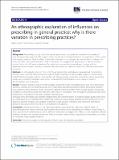An ethnographic exploration of influences on prescribing in general practice : Why is there variation in prescribing practices?
Abstract
Background: Prescribing is a core activity for general practitioners, yet significant variation in the quality of prescribing has been reported. This suggests there may be room for improvement in the application of the current best research evidence. There has been substantial investment in technologies and interventions to address this issue, but effect sizes so far have been small to moderate. This suggests that prescribing is a decision-making process that is not sufficiently understood. By understanding more about prescribing processes and the implementation of research evidence, variation may more easily be understood and more effective interventions proposed.Methods: An ethnographic study in three Scottish general practices with diverse organizational characteristics. Practices were ranked by their performance against Audit Scotland prescribing quality indicators, incorporating established best research evidence. Two practices of high prescribing quality and one practice of low prescribing quality were recruited. Participant observation, formal and informal interviews, and a review of practice documentation were employed.Results: Practices ranked as high prescribing quality consistently made and applied macro and micro prescribing decisions, whereas the low-ranking practice only made micro prescribing decisions. Macro prescribing decisions were collective, policy decisions made considering research evidence in light of the average patient, one disease, condition, or drug. Micro prescribing decisions were made in consultation with the patient considering their views, preferences, circumstances and other conditions (if necessary).Although micro prescribing can operate independently, the implementation of evidence-based, quality prescribing was attributable to an interdependent relationship. Macro prescribing policy enabled prescribing decisions to be based on scientific evidence and applied consistently where possible. Ultimately, this influenced prescribing decisions that occur at the micro level in consultation with patients.Conclusion: General practitioners in the higher prescribing quality practices made two different 'types' of prescribing decision; macro and micro. Macro prescribing informs micro prescribing and without a macro basis to draw upon the low-ranked practice had no effective mechanism to engage with, reflect on and implement relevant evidence. Practices that recognize these two levels of decision making about prescribing are more likely to be able to implement higher quality evidence.
Citation
Grant , A , Sullivan , F & Dowell , J 2013 , ' An ethnographic exploration of influences on prescribing in general practice : Why is there variation in prescribing practices? ' , Implementation Science , vol. 8 , no. 1 , 72 . https://doi.org/10.1186/1748-5908-8-72
Publication
Implementation Science
Status
Peer reviewed
ISSN
1748-5908Type
Journal article
Rights
Copyright ©2013 Grant et al.; licensee BioMed Central Ltd. This article is published under license to BioMed Central Ltd. This is an Open Access article distributed under the terms of the Creative Commons Attribution License (http://creativecommons.org/licenses/by/2.0), which permits unrestricted use, distribution, and reproduction in any medium, provided the original work is properly cited.
Collections
Items in the St Andrews Research Repository are protected by copyright, with all rights reserved, unless otherwise indicated.
Related items
Showing items related by title, author, creator and subject.
-
Effect of free medicine distribution on health care costs in Canada over 3 years : a secondary analysis of the CLEAN meds randomized clinical trial
Persaud, Nav; Bedard, Michael; Boozary, Andrew; Glazier, Richard H; Gomes, Tara; Hwang, Stephen W; Jüni, Peter; Law, Michael R; Mamdani, Muhammad; Manns, Braden; Martin, Danielle; Morgan, Steven G; Oh, Paul; Pinto, Andrew D; Shah, Baiju R; Sullivan, Frank; Umali, Norman; Thorpe, Kevin E; Tu, Karen; Wu, Fangyun; Laupacis, Andreas; CLEAN Meds study team (2023-05-26) - Journal articleIMPORTANCE : Few interventions are proven to reduce total health care costs, and addressing cost-related nonadherence has the potential to do so. OBJECTIVE : To determine the effect of eliminating out-of-pocket medication ... -
Pädiatrische versorgungskonzepte in Europa
Weber, Martin W; Backhaus, Sophia; Chukwujama, Obiora; Fenski, Friederike; Henking, Christoph; Schatte, Laura; Aleman-Diaz, Aixa Y (2018-01-19) - Journal articleTo promote children’s health in Europe, the World Health Organization (WHO) developed the European child and adolescent health strategy 2015–2020, which is supported and will be implemented by all Member States (MS). In ... -
Association between tobacco control policies and current smoking across different occupational groups in the EU between 2009 and 2017
So, Vivian H. T.; Best, Catherine; Currie, Dorothy; Haw, Sally (2019-08) - Journal articleBACKGROUND: This study investigated the cross-national and longitudinal associations between national tobacco control policies and current smoking in 28 European Union (EU) member states between 2009 and 2017. It also ...

